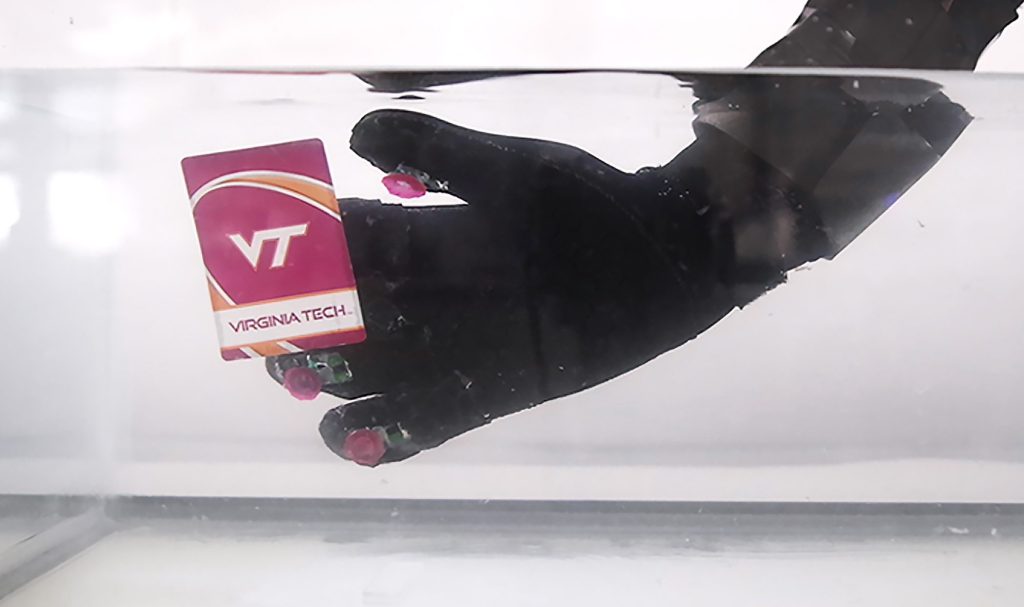It is a well-known fact that an octopus can easily grasp anything that slips from our hands in the water. In order to transfer the abilities of exotic aquatic animals to humans, researchers have now developed a biologically inspired glove. They are equipped with suction cups whose holding capacity is automatically controlled by a sensor system. Tests show that wet objects can be held safely and gently with “Octa-glove”. The developers say that this concept has many possible applications.
Humans are wild creatures, so in order to acclimatize to the underwater world we have to equip ourselves with technology: scuba tanks let us breathe, neoprene suits keep us warm and goggles let us see. To make up for another underwater vulnerability, there are hardly any effective solutions yet: Our hands usually have trouble grasping wet objects. However, this ability is required: rescue divers, underwater archaeologists and many other “aquatic craftsmen” have to deal with slippery objects or living creatures. In order to hold it tightly, the holding pressure must often be increased significantly. But sensitive objects or living organisms can of course be damaged.
Role models of eight arms on the horizon
Therefore, the research team led by Michael Bartlett of Virginia Tech in Blacksburg has dedicated itself to developing a concept that would enable people to be more sensitive in the water. As is often the case in technology, scientists have drawn inspiration from nature. Specifically, the focus was on the masters of capturing the kingdom of Poseidon: octopuses. It is known that the main elements of their abilities are suction cups, which are under the control of a well-developed muscular and nervous system. After the wide outer edge of the suction touches the surface, doing so activates the muscles in the concave area behind the edge. In this way, the suction cups can provide negative pressure with adhesive force. “What is interesting is that octopuses control their many suction cups by processing information from different sensors. So the octopus combines suction technology with sensors and controls to manipulate underwater objects,” says Bartlett.
In order to turn the model into a glove concept, the researchers first designed a robust system for suction cups: flexible rubber handles with soft membranes that can be pneumatically activated. The developers came very close to the octopus version: the concept of sticking can be associated with flat and curved surfaces. After developing this adhesive system, the scientists took up the challenge of giving the glove sensitivity. To do this, they equipped it with a series of so-called small LIDAR proximity sensors. These optical sensors can detect how close an object is.
Artificial suction cup and nervous system
The suction cups and LIDAR were then connected via a microcontroller to link the detection of objects to the activation of the suction cups, mimicking the squid’s nervous and muscular systems. Then the scientists combined all the elements into a neoprene glove. There is a sensor suction cup on each finger of this “eight glove”. “Just move your hand toward an object, and the glove automatically takes over the task of grasping: the electronics can quickly activate and release the suction cup. This allows you to grab wet or submerged objects without crushing them. All without the user having to press a single button,” Bartlett explains. .
The researchers were able to demonstrate this ability on their concept in a series of tests: The glove can be used gently to lift or grab objects that have many different properties. It is not necessary to hold it: small objects can be picked up with just one finger with the suction cup – then more units are used for larger objects. “These abilities mimic the complex manipulation, perception, and control of cephalopods,” says co-author Ravi Totika of Virginia Tech. However, the scientists stress that further development work is necessary in order to get closer to the highly complex performance of the natural models. “Our approach is certainly a step in the right direction, but we still have a lot to learn about squid before we reach nature’s full capabilities,” Totika said.
However, according to scientists, an interesting potential of the technology is already emerging: an octopus glove can help “craftsmen” in the water to be more sensitive, facilitate their work and protect sensitive objects or organisms during handling. There could also be potential applications in robotics: Scientists say that technical systems – for example in healthcare or in manufacturing – could use the concept of an octopus to get a better grip on wet objects.
Source: Virginia Tech, technical article: Science Advances, doi: 10.1126/sciadv.abq1905
Video © Virginia Tech

“Total coffee aficionado. Travel buff. Music ninja. Bacon nerd. Beeraholic.”







More Stories
Researchers detect extremely high-energy gamma rays
Anxiety disorders in old age increase the risk of dementia
Researchers are particularly fascinated by these exoplanets.